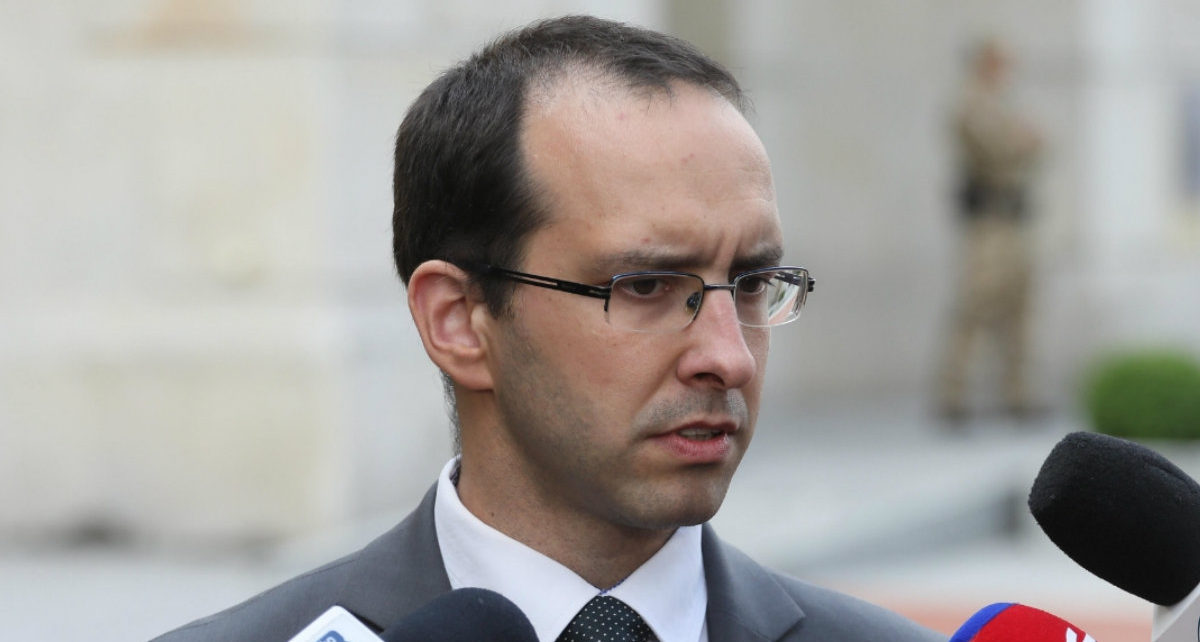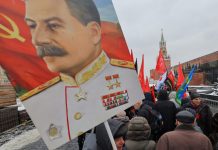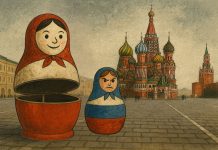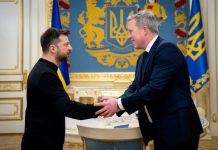By Stanislaw Żaryn, for StopFake
In the United States, the formation of the new administration of President Donald Trump has just been completed. However, the new president’s inauguration does not mean the end of the formulation of US policy in the directions that are most important for the country. It is clear that the eyes of the world are on Washington today. The US president is the leader of the West. From this point of view it is only natural to wait for the priorities of action to be set. From Poland’s perspective, the most important question is what the new president’s policy towards Central Europe will be, what his position on NATO’s eastern flank will be, and what his attitude towards Russia’s aggression against Ukraine and towards Russian imperialism will be. It is high time for Poland to play a special role by presenting in Washington our perception of the actions of the Russian Federation as well as our historical experience. It is crucial for us to share our interpretation of Russia’s actions and to point out the dangers for the future. The Kremlin will try to continue its policy of aggression – which sooner or later will directly affect U.S. interests – while at the same time trying to deceive others with a vision of “making a deal,” of seeking an agreement. We have seen such actions on many occasions before. What is important for the Western world today is to develop the ability to identify real threats from Russia.
Soviet aggression
The experience of the Central and Eastern European countries is clear. Poland, the Baltic Republics, Ukraine have experienced first-hand what Russian and former Soviet imperialism is all about. And they have had many tragic experiences with the crimes committed by the Kremlin. Poland in the past centuries has suffered mass ethnic cleansing, the criminal attack of 1920, the deportations to Siberia, the attempts to divert the state in the 1930s, the unleashing of the Second World War, the mass crimes and repressions during the war, the postwar crimes of oppression of Poles, the political crimes repeated in 1945-89, the mass suppression of popular mutinies, the massive surveillance system used during the Cold War. All this adds up to a history of Soviet aggression against Poland and Poles. The experience of our relations with Russia clearly shows that its actions have always been characterized by aggression and crimes. Crime is not a deviation from the mainstream of the Russian state. Rather, its absence was the abnormal state.
The Polish experience is by no means unique. The truth about the nature of Russian actions is more generally recognized the closer one gets to Russia. For those looking at Russia from afar, it is much more difficult to know the truth, something that Russian propaganda and intelligence services have tried to maintain for many years by engaging in various disinformation operations under the Kremlin’s banner. Among other things, they have been working for decades to falsify the true image of Moscow. This was evident as early as the beginning of World War II. When Nazi Germany attacked Poland on September 1, 1939, Hitler expected Stalin to make good on his promises and attack our country as well. This did not happen. In the days that followed, Germany pressured the Soviet Union to attack. On September 10, a telegram reached Berlin explaining the reasons for Stalin’s delay. Soviet Russia informed its ally of its intention to announce in the coming days that Poland had fallen and that Soviet troops would have to “take the Ukrainian population and the ‘Belo-‘Russians’ into protection” because they were under threat. “This argument is intended to preserve the credibility of the Soviet Union in the eyes of the masses and at the same time allow Russia to avoid the image of an aggressor,” – Molotov explained. As is known, the attack from the East was launched on September 17, 1939, and sealed the fate of Poland and other Central European countries. The archives show that Stalin did not so much delay his decision as wait for an opportune moment to present the attack “in the right light”. When Hitler broke the alliance with Stalin in 1941 and invaded the Soviet Union, the propaganda lie that had been used before allowed Stalin to change sides more easily and to work hard to erase his cooperation with Hitler. This is the clue of understanding why the cloak of propaganda is so important to Moscow. First and foremost, it allows Russia to avoid responsibility for its crimes and aggressions, which it has been committing for decades.
The cloak of propaganda, which the Soviet services readily used, had a significant impact on the history of post-war Europe. The effective cleansing of Stalin from the odium of unleashing the war enabled him to enter the game of power distribution in Europe that was to last for decades. The cover-up of which Molotov had written was thus effective. It is not surprising that Moscow continued in the same vein. Soviet or later Russian propaganda cover-up campaigns of the same kind could be seen, for example, at the time of the discovery of the crime of genocide against the Poles in Katyn (the USSR blamed Hitler), as well as when it took control of Poland and the countries of Central and Eastern Europe in 1945 (Russia to this day refers to this as “liberation”), and in subsequent years during military operations in Afghanistan, Vietnam, the Korean peninsula, or on the occasion of the Cuban missile crisis. Soviet propaganda covers were commonplace during the Cold War. Back then, the Soviets spent millions of dollars on front organizations to soften up the West, sow ferment and disinformation, and manipulate opinion about Russia with false messages made in Moscow. This modus operandi has been adopted by modern Russia. Back then, the Soviets spent millions of dollars on façade organizations to soften up the West, sow ferment and disinformation, and manipulate opinion about Russia with false messages made in Moscow. This modus operandi has been adopted by modern Russia. The unleashing of the second Chechen war in 1999 on a fabricated pretext, or the propaganda facade used to attack Georgia in 2008, belong to the same toolbox of Russian special services. Similar information operations can be traced back to the beginning of the war against Ukraine. As early as 2014, a propaganda operation was created to justify an attack on Ukraine, and later it was used to justify a full-scale invasion.
“It’s not our fault.”
On various occasions, Russia has used propaganda presents itself as a defender of values, its citizens, or a victim of world injustice, forced to react. In such communications, Russia was never the aggressor. Because it couldn’t be. This mechanism continues to this day – the Kremlin launches a propaganda campaign either at the moment of committing a crime, or preventively, in order to “avoid the image of an aggressor” at the time of the attack, and thus avoid settlements. What Molotov once described is being implemented today.
For Russia, this kind of influence is part of its strategy and is taken seriously. Why? According to the “Molotov Doctrine”, it is about avoiding the odium of being the perpetrator. The Kremlin, which has been using crimes as a means of political influence for decades, thus avoids accountability, while Russian leaders are accepted by the world. So it is about allowing criminals to escape any accountability. But more than that, Russia wants to pretend to be a civilized country, not the rogue, terrorist state it has become. This is crucial to Moscow’s desire to pass itself off as the “conscience of the world”. In today’s politics, it is evident: on the international stage, the Kremlin is eager to present itself to this day as “the savior of Europe from the hands of Nazism,” expects gratitude for its actions during the Second World War, and now argues that it is the “defender of values” and peace, the guardian against the “return of fascism”. It cultivates this message in order to force the world to submit to its interests and demands. On the other hand, it reinforces the process of brainwashing Russians by convincing them that Russia has a historical mission to defend values. This is how the invasion of Ukraine was and is being explained. This, unfortunately, works, the lie, reproduced daily, allowed to produce real support of Russians for this brutal war. Today, unfortunately, the Russian public, fed by the Kremlin’s propaganda, supports the war and supports the authorities that are waging this war. The authorities have turned Russians into a society of barbarians, which has been brought about by systemic solutions related to, among other things, lying propaganda. A very important element of this is the eradication of the truth about Soviet and Russian crimes from the public consciousness. Russia’s progressive restalinization implies a return to criminal practices on a massive scale, but also to aggressive propaganda and censorship. This is a decades-long challenge for NATO.
A country set on a lie
Russian lies and crimes are intertwined and are the foundation of Russia and its imperial policy. Unfortunately, however, the world has never clearly pointed out that Russia is a criminal country with crime and violence in its nature. It has never held Russian leaders and decision-makers accountable for their criminal actions. This failure has dramatic consequences. For it allows Russia to perpetuate a message to its own society based on hatred of other states and nations, and in international politics it allows it to resort to violence again. Unnamed and unaccounted for crimes repeat themselves. If the perpetrator is not held accountable, he will resort to violence again. Therefore, today it should be in the interest of the entire West to hold a trial for Russian aggression. A kind of “Nuremberg” for Moscow’s long-standing criminal actions is a necessary factor in ensuring security and peace in Europe. Rehabilitation programs, in turn, must be extended to Russian society, which today is a victim of hatred and shaping by Russian special services. This process degenerates the Russian people and creates among them a dangerous tendency to aggression against other countries and nations. Without a real kick in the teeth of Russian imperialism, there will be no chance for a secure future in Europe.
Today, Russia is on the warpath, has expanded its army, converted its economy to a war model and intensified its propaganda attacks against the West. And it intends to continue its aggressive actions. Despite this, there are forces and governments in the West today who are fed up with supporting Ukraine and want to force Kyiv to start talks with Russia and agree to a ceasefire, or even give permission to give up occupied land. This could lead to another “reset” and let Russia off the hook. And that is a ready recipe for another aggression. For once again, Russia will not be held accountable for its crimes, and aggression will prevail as a tool to influence even more countries, perhaps NATO members. Therefore, Russia must not be forgiven and let go: either militarily, economically or politically, but also on the level of its propaganda activities. Russia is a country of criminals, terrorists and bandits. The Kremlin must be treated as such and begin to answer for its crimes. The other course of action would be to invite more trouble in Europe. Therefore, it is crucial for the Western world to have a realistic view of Moscow’s goals and plans of action today, but also to see through the propaganda game being played against the U.S. and others. The goal is to demonstrate to the new administration that it is possible to continue “business as usual” with Russia, to engage in partnership relations. In response to the expectations of a part of the U.S. establishment to focus on threats in the Pacific, Moscow will try to present itself as a rational, albeit tough, partner on the international stage. It will again resort to the tactic of obfuscating its own criminal actions and hiding its imperial plans. That is why it is so important today to speak clearly and openly about the threats posed by Russia. For Russia is already a source of threat to the United States. As The New York Times recently reported, Moscow has in the past attempted to organize terrorist attacks against the U.S. using explosives mounted on airplanes. This is one of many pieces of evidence pointing to the fact that Russia is trying to launch some kind of aggression against the US. For Moscow, although it is now focusing on Ukraine and making real demands on Central Europe, the strategic target is the United States. The vision of “getting along” with Russia in order to avoid threats to the U.S. is therefore a pipe dream that fits very well into the “Molotov Doctrine”. Today, Russia can be stopped by tough sanctions, the Ukrainian army, and a realistic assessment of its actions. And a relentless reckoning. If the Russian regime is not brought to a deep crisis, if the authoritarian government is not purged along the lines of the accountability of the Germans after the Second World War, if Russians are not included in rehabilitation programs, Russia, far from retreating, will actually intensify its aggression. What Moscow and the world need today is a process of rehabilitation of Russia, something in the form of the “Nuremberg 2.0” initiative.
By Stanislaw Żaryn, for StopFake
Stanislaw Żaryn is an advisor to the President of the Republic of Poland





